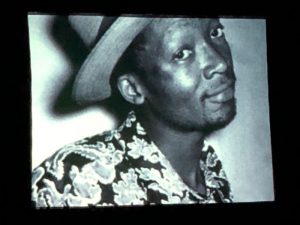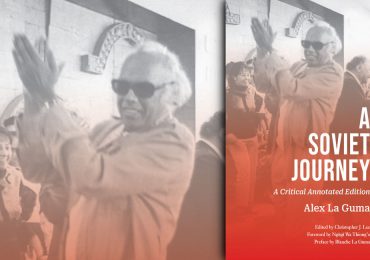At a recent Johannesburg symposium on the life of literary icon Can Themba, organised by author Siphiwo Mahala as a coda to his doctorate, Professor Muxe Nkondo delivered the following keynote address, which both reaffirms Themba’s place in the canon and holds him up as role model for South Africans to follow, when considering fellow citizens who are not explicitly like themselves.

Can Themba: The Power of the Creative Imagination and the Possibility of Solidarity and Social Cohesion in Our Time
Keynote Address by Professor Muxe Nkondo presented at the Can Themba Symposium held at the Market Theatre, Johannesburg, 13 September 2018
September seeks to illuminate debates about what should be preserved as heritage, about the form in which heritage should be conserved, and how it should be used in the present. These debates are not limited to tangible objects and places, but extend to intangible heritage of social practices and social memory. Siphiwo Mahala’s recent doctoral thesis on Can Themba’s creative writing, his documentary, Teacher in the Newsroom, and his creative interpretations and re-enactments of ‘The Suit’ in African Delights, affirm the importance of literary heritage as a public good, and uncover the ways in which literary heritage embodies relationships of mutual recognition as well as imaginative identification with the other in a society of differences.
Siphiwo Mahala identifies a stratum of critical engagement with texts in Can Themba’s writings that constitute what one might call the sphere of his originality and that is irreducible to a set of theoretical approaches. He elevates discussions of Can Themba’s work to a new level of analytical richness and precision. The documentary Teacher in the Newsroom is a tour de force of critical dramatisation.
This address carries on from the review I wrote in 1972 of Can Themba’s The Will to Die, published in The Journal of Commonwealth Literature. If it has a different feel from the early study, that is because of the nearness—in more than one sense—of Can Themba. Though it is now fifty years since he died, not only is he one of our greatest short story writers, he is one of the greatest writers of our politics and civilisation. The questions and the pressures that preoccupied him have still the same urgent relevance for us today. The way things have developed since his death in Swaziland exile have had no tendency to make diagnostic insight the less important to us, or the positive enlivening and enlightenment—the education—he brings the less necessary.
Many other studies will be conducted on Can Themba. Some of them will aim at a comprehensiveness that doesn’t belong to my own purpose. And if voluminous ‘authoritative’ treatment is needed, the authority on Can Themba will not be also to confine himself or herself to a single study, even an extensive one. Whatever may be the point of such studies, the treatment that Can Themba is in need of now is different. The very largeness and complexity of the subject he represents makes it necessary to define, clearly and challengingly, where the centre lies. What, above all, is Can Themba? As what should we primarily think of him? There has always been a readiness to think of him as an extraordinary gifted writer, but as what, above all, has he established his indisputable presence among us and his permanence?
Can Themba’s genius is distinctively that of a short story writer, but as such he is remarkable. One wouldn’t, it is true, call Can Themba’s poems and biographical sketches great writing; but he seems to me to be plainly one of the greatest masters of the short story Africa has ever produced. Perhaps there is need to ask how we can explain Lewis Nkosi being able with so little misgiving to bring the charge of confining his brilliance ‘to journalism of an insubstantial kind’. It is, I think, worth inquiry because the challenge leads us to certain useful formulations regarding the nature of Can Themba’s greatness and the significance of his work today.
I myself am dealing with a writer who has been for me a major apartheid, anti-apartheid and post-apartheid fact. Now, then, after so many rereadings of his work, I feel (however mistakenly) that I am qualified to attempt a critical revaluation of his work. I have taken immense pains over his stories, poems, journalism and biographical sketches, going through and through all that is accessible of Can Themba, and when I look at my 1972 article, I can judge that my sense of being critically qualified is well-grounded. When I ask where I could have found the hint of a better understanding of ‘The Suit’, Requiem for Sophiatown, The Will to Die, ‘Crepuscule’, ‘Kwashiorkor’, ‘Forbidden Love’, ‘The Dube Train’, ‘Marta’, ‘The Nice Time Girl’, ‘Mob Passion’, the answer is, on discourses on the creative and empathic imagination in the last fifty years. There is now, so far as I am aware, so much about the personal, social and political value of the creative imagination, so much about the resources and possibilities of language, and so much about the limitations of abstract reason, so much about the complex relationship between lived experience, aesthetics, politics, philosophy, history, knowledge and ethics. Edified by all this, my commentary is a serious tribute to a great writer by someone wholly convinced of his greatness and convinced that he deserves a much fuller study.
Lewis Nkosi reminds us of the literary criticism of the sixties and seventies in Britain and the Commonwealth; the modernist, neoclassical preoccupation with structure and form, with ‘words on the page’, and with the poetic image. The larger question—the role of the creative imagination in augmenting our capacity to relive states of being other than our own—didn’t receive the focused attention it so deserves.
In his best short stories, solidarity depends on a recognition of the reality of other persons—be it an urchin, a kwashiorkor patient, an unfaithful partner, an English girl passionately in love with one of the inmates of Sophiatown, an alcohol addict, a shebeen queen, a-never-do-well seized by the will to die—and on the capacity to regard the other as yourself, and on the equivalent capacity to merely regard oneself as an individual among many.
It is impossible not to be impressed by the authoritative manner in which Can Themba sets out the various steps of his narratives. He quite plainly knows where the narratives are leading him, and knows which moments are conclusive and which are not. He is a creative artist in the very best sense. His work is not a criticism of anybody else’s work, nor a footnote to anybody’s literary theory. It is independent and clear, and truly original, always trying to capture the experimental and tentative drama of consciousness. His work defends the claim that only imaginative identification with persons in lived moments should be the basis of social and political relations, and that subjective reasons are legitimate if only they are derived from imaginative identifications with real people in particular situations. But rational arguments about reason, human nature, the core self or something other and beyond can be avoided without completely subordinating the personal to the idiosyncratic and ephemeral.
The problem of how solidarity in South Africa is possible has much in common with the corresponding problem about identification with the pain and suffering of the other in a society of differences. By imaginative identification, Can Themba means not abject self-sacrifice, but an imaginative understanding of the next person, and a willingness to act in consideration of the feelings of other persons, without the need of ulterior motives.
How is it possible that the Can Thembas of our climate can motivate us? What sort of power and what sort of artistic form, are necessarily to augment our capacity to imagine states of being other than ourselves?
The challenge is how the Can Thembas of our political climate can motivate us to imaginative identification. Obviously, some account of this empathic imagination is needed by our Inclusive Growth Plan and participatory democracy, since there are few policies and development plans that do not include requirements of inclusion, caring, fellow feeling, solidarity and social cohesion.
For Can Themba, recognition of the other’s reality, and the possibility of putting yourself in his or her place, is essential. Can Themba makes us see the personal situation as a species of a more general scheme, in which the characters can be exchanged. The crucial factor that Can Themba injects into the scheme of solidarity is an attitude which you have towards your own case, or rather an aspect of the view which you take of your own pain and suffering. You attribute to it, in fact, a certain objective interest, and recognition of others as persons like yourself permits extension of the objective interest to the pain and suffering of South Africans in general, or to those of any particular individual whose situation is being considered.
The primary opposition to Can Themba’s view is personal and sectional egoism, a general position which corresponds to the controversy over identity and obligation, between the category ‘one of us’ against ‘not one of us’, to the historic legacy of oppositional difference, and the challenge to move beyond oppositional to complementary difference.
Solidarity and imaginative identification with the pain and suffering of others is an ethical requirement on action. The principle underlying solidarity requires that all reasons be construable as expressing objective rather than subjective values.
Can Themba’s work is informed by a deep and inspiring humanism. His best short stories trace the contours of everyday speech and life in Sophiatown mainly, and have a strong autobiographical character. They are engagingly spry and humorous, but also deadly serious. They express the sensibility of a man who spent most of his life in an apartheid slum, and his experiences seem to have particular relevance to contemporary South African life. At his best, his stories perfected a style so lucent, clear and bare of ornament that it is impossible to misunderstand them, just as he arrived, in the best of them, at a humanism so mature, sensitive, independent and unprejudiced that it would be a calamity not to understand him.
At his best, in ‘The Suit’ and ‘Requiem for Sophiatown’ for instance, there is no cheap journalistic sensationalism, no purple passage; the intelligence and creative imagination in him can be, as it is, the servant of a whole integrated psyche. It is the representative in consciousness of the complex need of the whole being, and is not thwarted or disabled by inner contradictions. We have on the one hand the technical sophistication of the creations, and on the other hand their organic wholeness and vitality.
It was in Can Themba’s character not to rest in populist and yellow journalism. He was acquainted with horror and foreboding and a state bordering on despair, but it was not possible for him to be defeatist. The affirmation of life was always strong in him, and he had always that profound sense of responsibility which, whatever one must conclude about some of its manifestations, is of his strength and genius. In them Can Themba lives his world in a tentative and immediately personal way that gives his work a different status as works of art not driven by ideology, theory, or categorical imperatives.
The blend of sad and comic is something one is conscious of throughout his work, as is the manner that seldom fudges the former or misses what is productive of the latter. The effect of the delirious Sophiatown on the inmates is seen with a kind of ironic sagacity or sardonic gentleness. Can Themba’s personal tone is unmistakable throughout. It is one which works from the imagination not towards a theory, it seldom interferes with the particular, its sensibility seems wholly in sympathy with the concrete, and sympathetic with the unfussy registration of lived experience. Generosity of attitude, alertness to discrepancy, the insight of the creative artist, the detachment of the ironist—these things make Can Themba not only a fine observer of place and society but also a most capable fashioner of character. Character, the steady shape of the person in all his or her connections and relations, is something Can Themba’s narratives are remarkably rich in. He apprehends existence through its concrete shapes and particulars and he works towards a vision of social relations by means of specific forms and humble everyday instances. More modest than most South African writers, Can Themba is concerned with hewing practical coal rather than with uncovering the mysterious substance of carbon, or he is concerned with the coal first and then the carbon no more than indirectly. If it were to be described precisely, one would have to say that it supports the concrete against the abstract, the individual against the globe, personal encounters against international trends.
It is the union of wit and sympathy in his writing which gives it its intensely personal flavour of blended tartness and generosity or, given the ghetto’s provenance of so much of it, of crudeness and delicacy. We find this double savour throughout the narratives, in the tone, in the imagery, in the reflections which jink suddenly from sadness to mordancy to humour.
To sum up, Can Themba distinguished between solidarity as identification with the other and the sense of oppositional difference which has gradually, over the last four centuries, been inculcated in South African society—a lack of sensitivity to the pain and suffering of others unless they are ‘one of us’ defined largely in racial, ethnic, class, and gender terms, and doubt that present institutional arrangements are adequate to deal with the pain and suffering of others, and curiosity about possible alternatives. Without the help of the creative, empathic imagination, this identification seems impossible—a social scientific invention, a pathetic attempt to politicise or philosophise the idea of a humanity at large, in the abstract. In a real sense, this is the ability to distinguish the question of whether you and the other share the same final vocabulary from the question of whether he or she is in pain. Can Themba’s work enjoins us to separate the question ‘are you one of us’ from the question ‘are you in pain?’





